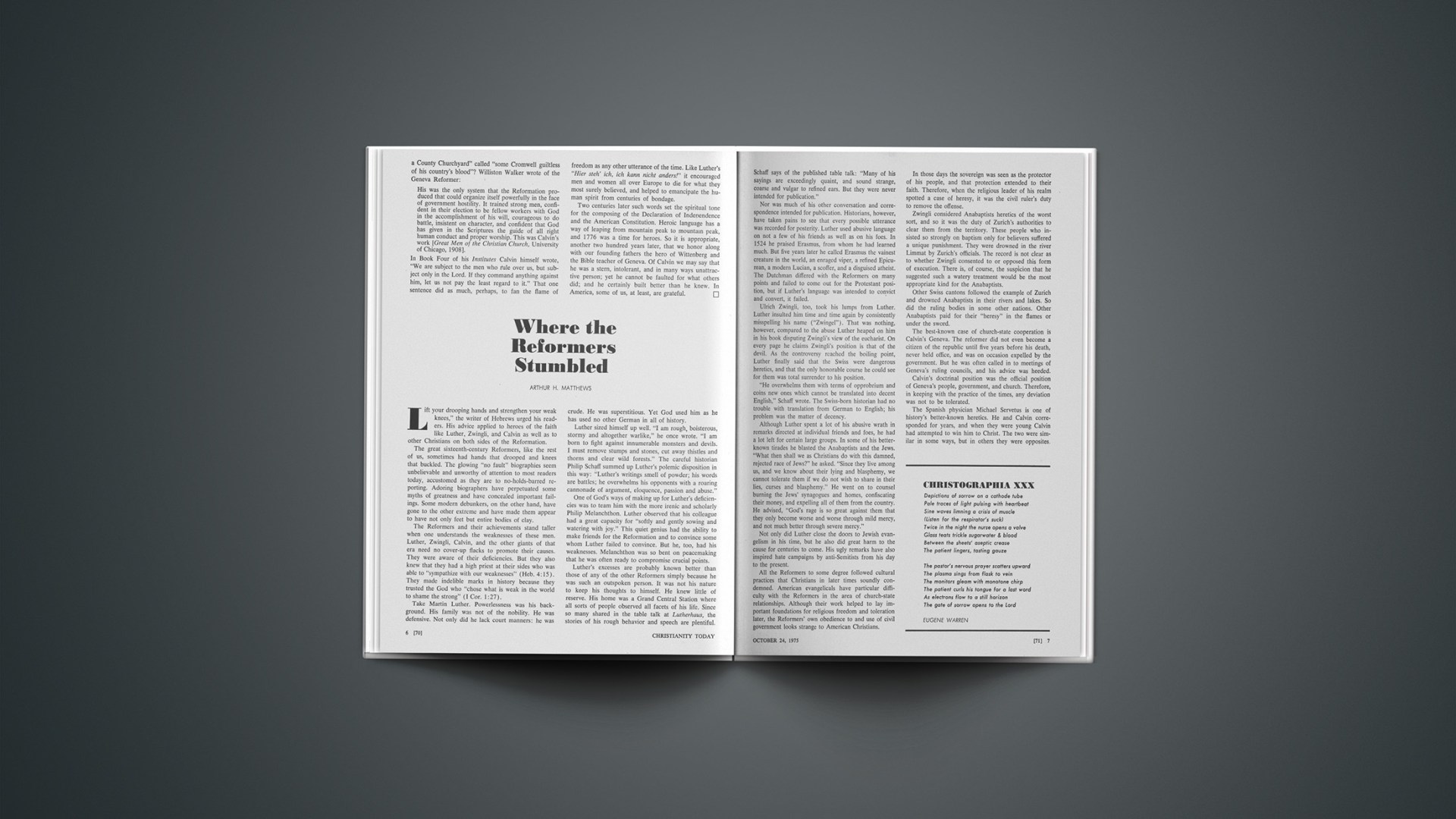Lift your drooping hands and strengthen your weak knees,” the writer of Hebrews urged his readers. His advice applied to heroes of the faith like Luther, Zwingli, and Calvin as well as to other Christians on both sides of the Reformation.
The great sixteenth-century Reformers, like the rest of us, sometimes had hands that drooped and knees that buckled. The glowing “no fault” biographies seem unbelievable and unworthy of attention to most readers today, accustomed as they are to no-holds-barred reporting. Adoring biographers have perpetuated some myths of greatness and have concealed important failings. Some modern debunkers, on the other hand, have gone to the other extreme and have made them appear to have not only feet but entire bodies of clay.
The Reformers and their achievements stand taller when one understands the weaknesses of these men. Luther, Zwingli, Calvin, and the other giants of that era need no cover-up flacks to promote their causes. They were aware of their deficiencies. But they also knew that they had a high priest at their sides who was able to “sympathize with our weaknesses” (Heb. 4:15). They made indelible marks in history because they trusted the God who “chose what is weak in the world to shame the strong” (1 Cor. 1:27).
Take Martin Luther. Powerlessness was his background. His family was not of the nobility. He was defensive. Not only did he lack court manners: he was crude. He was superstitious. Yet God used him as he has used no other German in all of history.
Luther sized himself up well. “I am rough, boisterous, stormy and altogether warlike,” he once wrote. “I am born to fight against innumerable monsters and devils. I must remove stumps and stones, cut away thistles and thorns and clear wild forests.” The careful historian Philip Schaff summed up Luther’s polemic disposition in this way: “Luther’s writings smell of powder; his words are battles; he overwhelms his opponents with a roaring cannonade of argument, eloquence, passion and abuse.”
One of God’s ways of making up for Luther’s deficiencies was to team him with the more irenic and scholarly Philip Melanchthon. Luther observed that his colleague had a great capacity for “softly and gently sowing and watering with joy.” This quiet genius had the ability to make friends for the Reformation and to convince some whom Luther failed to convince. But he, too, had his weaknesses. Melanchthon was so bent on peacemaking that he was often ready to compromise crucial points.
Luther’s excesses are probably known better than those of any of the other Reformers simply because he was such an outspoken person. It was not his nature to keep his thoughts to himself. He knew little of reserve. His home was a Grand Central Station where all sorts of people observed all facets of his life. Since so many shared in the table talk at Lutherhaus, the stories of his rough behavior and speech are plentiful. Schaff says of the published table talk: “Many of his sayings are exceedingly quaint, and sound strange, coarse and vulgar to refined ears. But they were never intended for publication.”
Nor was much of his other conversation and correspondence intended for publication. Historians, however, have taken pains to see that every possible utterance was recorded for posterity. Luther used abusive language on not a few of his friends as well as on his foes. In 1524 he praised Erasmus, from whom he had learned much. But five years later he called Erasmus the vainest creature in the world, an enraged viper, a refined Epicurean, a modern Lucian, a scoffer, and a disguised atheist. The Dutchman differed with the Reformers on many points and failed to come out for the Protestant position, but if Luther’s language was intended to convict and convert, it failed.
Ulrich Zwingli, too, took his lumps from Luther. Luther insulted him time and time again by consistently misspelling his name (“Zwingel”). That was nothing, however, compared to the abuse Luther heaped on him in his book disputing Zwingli’s view of the eucharist. On every page he claims Zwingli’s position is that of the devil. As the controversy reached the boiling point, Luther finally said that the Swiss were dangerous heretics, and that the only honorable course he could see for them was total surrender to his position.
“He overwhelms them with terms of opprobrium and coins new ones which cannot be translated into decent English,” Schaff wrote. The Swiss-born historian had no trouble with translation from German to English; his problem was the matter of decency.
Although Luther spent a lot of his abusive wrath in remarks directed at individual friends and foes, he had a lot left for certain large groups. In some of his better-known tirades he blasted the Anabaptists and the Jews. “What then shall we as Christians do with this damned, rejected race of Jews?” he asked. “Since they live among us, and we know about their lying and blasphemy, we cannot tolerate them if we do not wish to share in their lies, curses and blasphemy.” He went on to counsel burning the Jews’ synagogues and homes, confiscating their money, and expelling all of them from the country. He advised, “God’s rage is so great against them that they only become worse and worse through mild mercy, and not much better through severe mercy.”
Not only did Luther close the doors to Jewish evangelism in his time, but he also did great harm to the cause for centuries to come. His ugly remarks have also inspired hate campaigns by anti-Semitists from his day to the present.
All the Reformers to some degree followed cultural practices that Christians in later times soundly condemned. American evangelicals have particular difficulty with the Reformers in the area of church-state relationships. Although their work helped to lay important foundations for religious freedom and toleration later, the Reformers’ own obedience to and use of civil government looks strange to American Christians.
In those days the sovereign was seen as the protector of his people, and that protection extended to their faith. Therefore, when the religious leader of his realm spotted a case of heresy, it was the civil ruler’s duty to remove the offense.
Zwingli considered Anabaptists heretics of the worst sort, and so it was the duty of Zurich’s authorities to clear them from the territory. These people who insisted so strongly on baptism only for believers suffered a unique punishment. They were drowned in the river Limmat by Zurich’s officials. The record is not clear as to whether Zwingli consented to or opposed this form of execution. There is, of course, the suspicion that he suggested such a watery treatment would be the most appropriate kind for the Anabaptists.
Other Swiss cantons followed the example of Zurich and drowned Anabaptists in their rivers and lakes. So did the ruling bodies in some other nations. Other Anabaptists paid for their “heresy” in the flames or under the sword.
The best-known case of church-state cooperation is Calvin’s Geneva. The reformer did not even become a citizen of the republic until five years before his death, never held office, and was on occasion expelled by the government. But he was often called in to meetings of Geneva’s ruling councils, and his advice was heeded.
Calvin’s doctrinal position was the official position of Geneva’s people, government, and church. Therefore, in keeping with the practice of the times, any deviation was not to be tolerated.
The Spanish physician Michael Servetus is one of history’s better-known heretics. He and Calvin corresponded for years, and when they were young Calvin had attempted to win him to Christ. The two were similar in some ways, but in others they were opposites. Servetus was both fascinated by Calvin’s work and extremely critical of it. Finally Calvin decided that his priorities would not allow him to continue the correspondence.
By that time Servetus was living under a pseudonym in Dauphiné, an area of France not far from Geneva. He wrote anti-trinitarian books that were published in France and shipped to the major European centers. His identity was finally discovered (some say with Calvin’s help), and the Roman Catholic authorities of that territory put him on trial. In the midst of the proceedings he escaped. Instead of going to any number of places that might have been more hospitable, he headed for Geneva and certain confrontation with its famous theologian.
Unquestionably, Calvin took an active role in the heresy trial of Servetus. Because he propagated his beliefs publicly (especially in print), Servetus was considered a danger to church and state. Not only did he differ from Calvin’s doctrine; he was also charged with blasphemy and lying. Calvin never expressed regret over the prosecution of Servetus, nor did he oppose his execution. The record shows that he did attempt to keep his theological foe from being slowly burned at the stake. He favored a more humane death, such as beheading!
Regardless of what the record shows, that one death at the stake has forever labeled Calvin the “dictator of Geneva.” The state was responsible for the trial and the punishment, but because of the theologian’s influence and participation, history has given him all the blame. Current tourist guides make sure that their readers know about Calvin’s role in the trial and execution of Servetus, but they fail to note that Servetus was not put to death until the Geneva council’s decision was approved by those in other Swiss cities. Neither do these books point to the thousands of Protestants who were put to the stake by the civil authorities in other jurisdictions.
In a spot that is not on the popular tourist trails in Geneva stands a small monument. It was erected in 1903 by some Calvinists, on the 350th anniversary and on the site of Servetus’s death. The inscription on this “expiation monument” expresses regret that the methods of the times were used in the Servetus affair. These sons of the Reformation put the matter into perspective when they said that Calvin’s huge contributions were made despite this glaring error and that they honored him for his strengths and not for his weaknesses.
Current disciples of the sixteenth-century Reformers should do the same. They should remember the source of the Reformers’ strength and the motive for their reforming zeal. These were Christ’s men, first and last. Their general practice was in line with the admonition in First Corinthians 1:31, “Let him who boasts, boast of the Lord.” They honored the Bible as his Word. What Schaff said of Luther applies to the others as well: they “lived and moved in the heart of the Scriptures, and this was the secret of [their] strength and success.”
CHRISTOGRAPHIA XXX
Depictions of sorrow on a cathode tube
Pale traces of light pulsing with heartbeat
Sine waves limning a crisis of muscle
(Listen for the respirator’s suck)
Twice in the night the nurse opens a valve
Glass teats trickle sugarwater & blood
Between the sheets’ aseptic crease
The patient lingers, tasting gauze
The pastor’s nervous prayer scatters upward
The plasma sings from flask to vein
The monitors gleam with monotone chirp
The patient curls his tongue for a last word
As electrons flow to a still horizon
The gate of sorrow opens to the Lord
EUGENE WARREN










